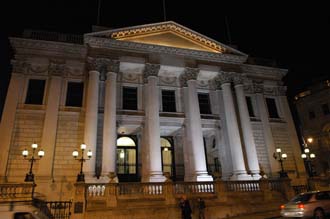Minister Alex White condemns attack on Paris office of Charlie Hebdo
I attended a Charlie Hebdo remembrance ceremony at Dublin Castle on Saturday which was organised by the NUJ.
I attended a Charlie Hebdo remembrance ceremony at Dublin Castle on Saturday which was organised by the NUJ.
Minister for Communications Alex White T.D., today published draft media merger guidelines for public consultation. These draft guidelines have been prepared under the Competition and Consumer Protection Act 2014, which came into effect last month.
It is telling that there are no voices calling for retention of the Senate in its current form. Even those who say we should keep the Senate appear to accept that it is fundamentally flawed, forcing them to ground their campaign on contradictory, and largely unworkable proposals for “reform”.
The case for abolishing the Senate is that there is no case for keeping it.
 The events of recent days give rise to very important issues which go beyond the personalities concerned. There is a need to have a debate on the nature and quality of representation and what we can expect from politicians and people in public life. I have just come from a meeting of the Joint Committee on the Constitution which is wrestling with issues pertaining to the electoral system and the nature and quality of representation that Deputies and public representatives are able to offer.
The events of recent days give rise to very important issues which go beyond the personalities concerned. There is a need to have a debate on the nature and quality of representation and what we can expect from politicians and people in public life. I have just come from a meeting of the Joint Committee on the Constitution which is wrestling with issues pertaining to the electoral system and the nature and quality of representation that Deputies and public representatives are able to offer.
Leaving aside who he or she may be, the introduction of a directly elected mayor of Dublin has the potential to bring about positive and important change to our system in terms of representation and the quality of democracy in the city. I note in this morning’s newspapers that the Local Government (Office of the Dublin Mayor and Regional Authority of Dublin) Bill was apparently discussed in Cabinet yesterday. Can they not publish the scheme of the Bill now? If we have to await its publication next week or in the coming weeks, it will not be possible to have the quality of debate we need on such a profound change. I strongly support the proposal in principle and I want it to work.
There may not be sufficient time for proper debate on the very real changes that could come about. We may need to amend a host of legislation if the proposal is to work. It is not possible to introduce a stand-alone Bill on a directly elected mayor of Dublin without amending local government legislation and, perhaps, the planning and development Acts. If I argue that we need more time when the Bill is published sometime in the next three or four weeks, I do not want to be accused of raising obstacles simply because I want to debate it properly. I ask for sufficient time to tease out the issues and if we have to amend other legislation to improve the quality of our democracy, let us do so.
During canvassing for a Yes vote in Dublin South, I have heard some people say that they are considering voting no in Thursday’s referendum because they do not wish to see the powers of the Oireachtas ‘handed over to Brussels’. As a senator, I must respectfully disagree with this claim.
Of the 60 Senators, I know of only four who are advocating a No vote, and in the Dáil, all the major political parties bar one are in favour of the Lisbon Treaty. The reasons for this outlook are simple.
While there are many reasons to vote Yes on Thursday, as a legislator, I must put forward two reasons on why the Treaty will actually provide more power to the Oireachtas, contrary to what many on the No side believe.
Increasing the role of National Parliaments
For the first time, the Oireachtas will have the powers to examine proposed legislation coming from the EU. If TDs and Senators have objections to that legislation, they can raise their concerns and have the legislation re-examined.
Yet, if Ireland still feels that proposed legislation is contrary to our interests, it can be struck down with the support of a majority of our EU colleagues. As I pointed out yesterday, the majority of what comes from the EU is technical and more important issues such as justice and home affairs are not dealt with in this way.
This is the first time that national parliaments have the opportunity to fully examine the legislation produced by the EU. It is something the Labour party have sought for some time and it can only lead to an enhancement of democracy in the European Union.
Citizens Initiative
Furthermore, the Treaty for the first time allows citizens to get involved in the inner workings of the Union. Where one million European citizens petition the European Parliament regarding a particular subject, it is the duty of the EU to respond.
This is a significant step forward towards opening the European Union up to citizens. I have no doubt that this ‘Citizens Initiative’ will lead to further initiatives in the policy-making process.
While these are just two reasons to vote Yes on Thursday, any suggestion that the Lisbon Treaty will erode Irish democracy should be rejected. If the Treaty is passed, the EU will be more accountable to the Oireachtas and to the citizens of Europe. That can only be a good thing. Vote Yes on Thursday.